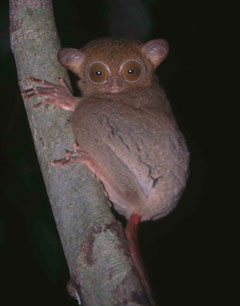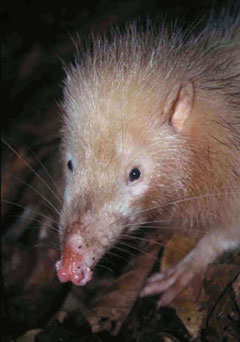Selective logging profoundly reduces the abundance of rare forest species according to surveys of logged and unlogged rainforests on the island of Borneo, one of the most biodiverse parts of southeast Asia. The results, published in a trio of papers, have implications for biodiversity and forest conservation efforts in one of the world’s most threatened ecosystems.
Trapping hundreds of small mammals using locally made wire-mesh live traps equipped with a plastic roof for rain protection, biologists led by Dr. Konstans Wells of the University of Ulm in Germany found that logging had a variable effect on forest species. Common species seemed relatively unaffected by timber harvesting, with relatively consistent “patterns of dominance, evenness and fluctuations in abundance.” Rare species, however, were found to be “more vulnerable to forest degradation than commonly caught species, resulting in the complete loss, or a decrease in numbers, of certain groups, such as arboreal small mammals and Viverridae”, carnivores in the mongoose family.
“Logging causes many times the disturbance one would expect in natural tropical rainforests and inevitably changes the composition and functional role of cryptic small mammal assemblages, of which we know very little,” Dr. Wells told mongbay.com via email. “Although logged rainforests provides habitat for many common small mammal species, rare and more specialized species are vulnerable to forest degradation and remain unrecorded even with intensive survey efforts.”

The Western tarsier, Tarsius bancanus, is a small nocturnal primate that feeds on fast-moving insects. Photo © Konstans Wells.
The Moon rat, Echinosorex gymnura, at nearly the size of a domestic house cat is the biggest insectivorous rat. Nocturnal, it feeds at night on various small animals, both in primary and secondary forests. Photo © Konstans Wells. |
“However, the story is more complex: differences in movement patterns and parasites of common species in logged forests show us further that logging affects the living conditions in logged forest for a large range of species,” he added. “This may also have consequences for the maintenance of ecosystem services provided by small mammals.”
Through their seed and seedling consumption, small mammals play an important role in forest ecology, at times enhancing or suppressing forest regeneration after logging. As such, changes in the abundance of small mammals is thought to be a significant determinant of overall forest health. Because much of Borneo’s forests either have been logged or are expected to be logged in the future, a better understanding of how small mammals are affected by timber harvesting can help conservation managers better forecast the likelihood and rate of forest recovery. Further, if rare species fail to persist in logged forests then special conservation efforts will be required to prevent their extinction.
“The role of rare species remains even more elusive, although the reduced species richness in our study clearly suggests that some species are vulnerable to severe population reductions or extinction by logging-induced changes,” wrote Wells and colleagues in a Journal of Biogeography paper published in 2007. “The inconsistency in logging responses among species, and the large habitat variability that is intrinsic to rain forests and that is further generated by various anthropogenic impacts, present a challenge when selecting areas for conservation… Although logged rain forests might house large proportions of the small-mammal assemblages found in undisturbed forests, some rare species will remain unprotected if unlogged forests are not conserved, as these forests remain the major source of the region’s immense species richness.”
References
Wells, K., Kalko, E.K.V., Lakim, M.B., & Pfeiffer, M. (2007). Effects of rain forest logging on species richness and assemblage composition of small mammals in Southeast Asia. Journal of Biogeography. doi:10.1111/j.1365-2699.2006.01677.x
Wells, K., Pfeiffer, M., Lakim, M.B. & Kalko, E.K.V. (2006) Movement trajectories and habitat partitioning of small mammals in logged and unlogged rain forests on Borneo. Journal of Animal Ecology, 75, 1212—1223.
Wells, K., Smales, L.R., Kalko, E.K.V., & Pfeiffer, M. (2007). Impact of rain-forest logging on helminth assemblages in small mammals (Muridae, Tupaiidae) from Borneo. Journal of Tropical Ecology (2007) 23:35—43.
